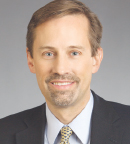
David Tuveson, MD, PhD
The American Association for Cancer Research (AACR) Virtual Meeting: COVID-19 and Cancer took place from July 20 to 22, 2020, attracting top scientific minds from around the world to present preliminary research on the ever-evolving COVID-19 pandemic and its intersection with cancer care. In an interview with The ASCO Post, Program Chair and incoming AACR President David Tuveson, MD, PhD, sheds light on how the meeting came together and its important takeaway points. Dr. Tuveson is the Roy J. Zuckerberg Professor of Cancer Research and Director of the Cancer Center at Cold Spring Harbor Laboratory, Cold Spring Harbor, New York.
Meeting Challenges and Objectives
What were the challenges in producing this meeting?
The main challenge was convincing extremely busy thought leaders to take the time to consider our invitation and speak about their preliminary work. Scientists are always hesitant to talk about preliminary work, because their research has not been properly vetted by peer review.
It can be difficult to get scientists and researchers to present what they know publicly before the research is ready for publication. We had to convince the best scientists working on COVID-19 to reveal what they are doing for the benefit of the world, our society, and our patients.
What were your objectives in designing the meeting?
We started thinking about it in April, when COVID-19 was becoming a pandemic. We were worried about patients with cancer and needed to know quickly whether they were at high risk and whether the virus would impact their care. Another objective was to determine how many cancer scientists and oncologists were participating in the fight against COVID-19.
We had anecdotal evidence that at hospitals throughout the country, oncologists, oncology nurses, clinical trialists, and house officers were being deployed to fight the pandemic, whether by treating patients with COVID-19 or by doing scientific research to develop tests to track COVID-19 infections.
From the top down, medical systems throughout the United States made decisions to close down buildings and put COVID-19 upfront. Decisions were made to delay elective events, including cancer screenings, and in many centers, the cancer workforce was deployed to tackle the virus. Oncologists were diverted to treat patients with COVID-19, medical students were sent to work as physician trainees in the emergency room, and clinical trials were closed to new enrollment.
Positive and Negative Consequences
What are the major takeaway points from the presentations at this meeting?
We have changed the way we take care of patients with cancer as a result of COVID-19, and some of the changes are positive. For instance, we have become nimbler in the way we design and conduct clinical trials. The U.S. Food and Drug Administration and other regulatory authorities have enabled doctors who conduct clinical trials to use telemedicine to ask patients questions once asked at clinic visits.
We are now utilizing modern technology in the conduct and design of clinical trials, and this will transform clinical trials, allowing people who live a distance from a major academic center to participate. The major hope is we will be able to broaden enrollment of the number of patients in clinical trials. This is a silver lining of the COVID-19 pandemic.
Another positive is that across the board, we have seen unprecedented collaboration among young, mid-career, and late-career scientists; physicians; government agents; and industry. And finally, the COVID-19 pandemic has actually exposed me to Twitter and changed my attitude toward it. Unlike my previous assumptions, Twitter is moving the field forward! I have learned important information about the coronavirus from Twitter. In the past, science was competitive. Now, we are seeing sharing at all levels, and a lot of it happens on Twitter.
To get a handle on COVID-19, cancer research should embrace virology, and scientists should publish ideas on Twitter and receive feedback. This collectivism will be philosophically and societally beneficial.
However, a major negative result of the COVID-19 pandemic is that many patients were unable to undergo potentially life-saving screening. Cancer screening was stopped so as not to expose patients to the coronavirus.
As Norman E. (“Ned”) Sharpless, MD, Director of the National Cancer Institute, pointed out in his talk, an estimated 10,000 excess cancer deaths from breast and colon cancers will result from delayed screening.
Keynote Speakers
Our keynote speakers ran the gamut. First, we had Anthony Fauci, MD, who is the epitome of the physician-scientist as Director of the National Institute of Allergy and Infectious Diseases and a wise purveyor of knowledge about COVID-19.
The second keynote speaker was Solange Peters, MD, President-Elect of the European Society for Medical Oncology (ESMO) and Chair of Thoracic Oncology at the Centre Hospitalier Universitaire Vaudois, Lausanne, Switzerland. She is involved in the ESMO COVID-19 database and is also participating in the CCC19 project being run out of Vanderbilt University in Nashville.
The final keynote speaker was Trevor Bedford, PhD, who has a journeyman’s curriculum vitae. He uses a Socratic method of teaching and gets you hooked by asking leading questions and then delving into those answers with more questions. Dr. Bedford studied at Harvard for his PhD, then went to the University of Michigan and University of Edinburgh for postdoctoral fellowships, and is now at the Fred Hutchinson Cancer Research Center. He is an evolutionary geneticist who teaches people about his data and ideas on Twitter.
DISCLOSURE: Dr. Tuveson reported no conflicts of interest.

